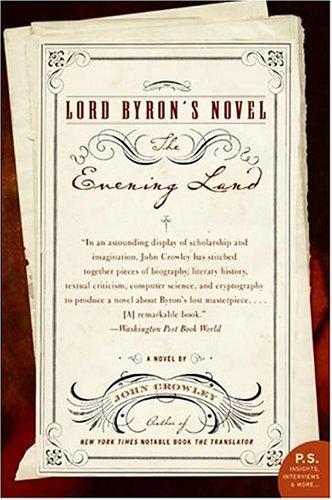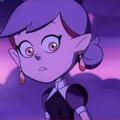Orlion reviewed Lord Byron's Novel by John Crowley (duplicate)
Review of "Lord Byron's Novel" on 'Goodreads'
4 stars
In between the seven years between the last and penultimate installments of his Aegypt cycle, John Crowley wrote two standalone novels of a different tone to his hermetic story. Far from being the mystical prose readers of his acclaimed Little, Big had come to expect/demand, these novels delivered a much more straightforward story, tighter plot, and clearer message. Lord Byron's Novel is the later of the two.
The Evening Land has what appears to be a complex structure. It consists of a novel that is written (allegedly) by Lord Byron with annotations by his daughter and 'founder of computer sciences', Ada Lovelace. Throughout the book, we are also treated to some e-mail correspondences between Alexandra "Smith" Novak and her various associates: Her estranged father Lee Novak and lesbian lover Thea. These correspondences mainly serve to show how the novel was discovered and enciphered.
This structure actually flows fairly well, with …
In between the seven years between the last and penultimate installments of his Aegypt cycle, John Crowley wrote two standalone novels of a different tone to his hermetic story. Far from being the mystical prose readers of his acclaimed Little, Big had come to expect/demand, these novels delivered a much more straightforward story, tighter plot, and clearer message. Lord Byron's Novel is the later of the two.
The Evening Land has what appears to be a complex structure. It consists of a novel that is written (allegedly) by Lord Byron with annotations by his daughter and 'founder of computer sciences', Ada Lovelace. Throughout the book, we are also treated to some e-mail correspondences between Alexandra "Smith" Novak and her various associates: Her estranged father Lee Novak and lesbian lover Thea. These correspondences mainly serve to show how the novel was discovered and enciphered.
This structure actually flows fairly well, with some of the e-mails serving as a means of clarifying/adding insight to passages of Byron's fictional novels all ready read by the reader or preparing the reader for passages to come. Ada's annotations serve as a more immediate explanation for some of the eccentracies of the Byronic prose and also to present information on Lord Byron as a person as Ada learns about the father she never knew.
The book is replete with several themes: father-daughter relationships, celebrity issues, Liberty, and Coincidences to name a few. These themes get treated throughout the fictional novel, notes, and e-mail correspondence but are never really resolved. Not in any overt way, any way. From history we know Ada gets buried next to her father, and resolutions for our modern characters can be implied, but these themes are mostly presented and withdrawn from, usually with some snide, knowing remark from the fictional Lord Byron. It is enough to leave more ending-oriented readers with a sense of being left with an incomplete novel.
And in a sense, it is an incomplete work. Lord Byron and his novel take center with Ada and Smith being mostly there to bring these elements to life. In essence, it is only by their interactions with the psuedonovel that we get to know them much at all. It is enough, though. Anymore actual prose may very well have upset the balance and created a lot of bloat. Then again, I kinda wished for more on the modern characters... as it stands, though, they exist for and only in relation to Lord Byron's lost novel.
Lord Byron's Novel: The Evening Land has the potential to appeal to a wider audience than John Crowley's other more acclaimed works. It is wonderfully crafted and I am under the impression that this book could only be successfully written by Mr. Crowley. It will most appeal to those who are interested in learning about/considering the personage of Lord Byron. It is also replete with plenty of 19th century writing conventions, so the potential reader who has no interest in either would probably do well to wait on reading this book.

